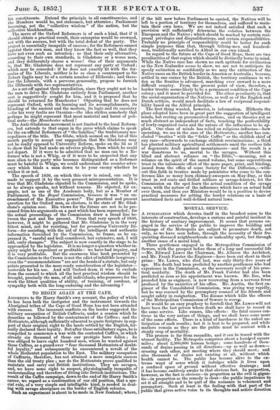TO BEGIN AGAIN AT THE CAPE.
Acconnum to Sir Harry Smith's own account, the policy of which he has been both the instigator and the instrument towards the Aboriginal tribes of the Cape of Good Hope has not been attended with success. The incessant conflicts on the border suggested the military occupation of British Caffraria, under a cession which he describes as followed by the contentment of the Caffres ; and the Hottentots, although sufficiently educated to quote Scripture in sup- port of their original right to the lands settled by the English, for- mally declared their loyalty. But after those satisfactory signs, he is compelled to commence a war with the contented Caffres in which already six thousand of those our proteges have fallen ; he was obliged to leave eighthundred men, whom he wanted against those Caffres, as a over "four thousand Hottentots of doubt- ful loyalty," and subsequently he encountered a revolt of the whole Hottentot population to the East. The military occupation of Caffriuia, therefore has not attained a more complete success than the old treaty plan ; nor do the Hottentots prove qualified to maintain and carry out British institutions. They are savages, and, we have some right to suspect, physiologically incapable of understanding and therefore of fitting into British institutions. The result of the Caffre campaign, down to the end of Sir Harry Smith's career, we regard as a confirmation of our old position, that a spe- cial rule, of a very simple and intelligible kind, is needed in deal- ing with savage aborigines on the border of English colonies.
Such an experiment is about to be made in New Zealand; where,
if the bill now before Parliament be carried, the Natives will be left to a.portion of territory for themselves and sabred to main- tain their own laws. We are not indeed satisfied that such a provision will sufficiently determine the relation between the
and the Native; which should be marked by certain reci-
procal and disqualifications and certain responsibilities. Probably no principle of responsibility could be better for such simple purposes than that, through tithing-men and hundred- men, traditionally ascribed to Alfred in our own island. In regard to the future at the Cape of Good Hope, there are two peculiarities of that region which should be distinctly borne in mind. While the Native race has shown no such aptitude for civilization as the New Zealander seems to show, we are not to anticipate its speedy extinction so confidently as we may the extinction of the Native races on the British border in America or Australia; because, settled in one corner by the British, the territory continues to wi- den as the frontier is advanced, marching ever onward to a more difficult country. From the present point of view, therefore a border trouble seems likely to be a permanent condition of the ape colony; and it must be provided for. The other peculiarity is, that the social organization of the Natives, as well as of the English and Dutch settlers, would much facilitate a law of reciprocal responsi- bility based on the Alfred principle.
The first thing wanted, however, is information. Hitherto the plans adopted have been in great part the suggestion of intelligent minds, but resting on preconceived notions, and on theories not so much abstract as independent of facts, touching the perfectibility of lowly-organized races and the nature of the influences to be ap- plied. One class of minds has relied on religious influence—how operating, we see in the case of the Hottentots ; another has con- cluded " treaties " with the "fickle Cairn" or the childish chief of any race—afterwards to exchange childish recriminations ; a third has planted military agricultural settlements amid the restless tide of degenerate Arab pastoral mountaineers—and the result is a war disastrous to us mortal to the savages. Without this
blind and abstract us, on "the Bible,"—meaning, not a reliance on the spirit of the sacred volume, but some superstitions trust in the talismanic effect of the mere paper, print, and binding, issued from the office of some Society for the Diffusion,—with- out this faith in treaties made by potentates who come to the con- ference like so many born chimney-sweepers on May-Day, or this trust in red coats and drilled soldiers as savage-hunters, let the Commission on the spot learn the actual condition of the savage races, with the nature of the influences which have an actual hold over them, and then our Ministers would be in a position to devise practical measures for setting the border relations on a basis of ascertained facts and well-defined natural laws.


























 Previous page
Previous page